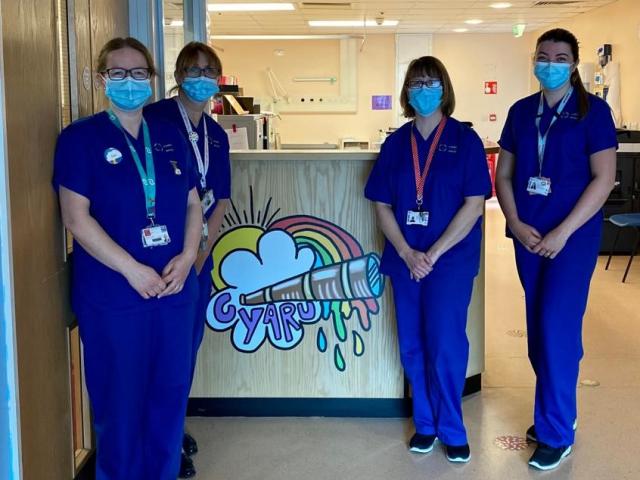
Life-changing research improving the lives of Welsh children and young people
18 November
For some children across Wales, clinical research is the only way to potentially receive new, life-saving treatments.
Rhian Thomas-Turner, Research and Development Lead at Noah’s Ark Children’s Hospital for Wales is championing children’s rights to participate in and benefit from research in Wales.
Only dedicated research unit for under 18s
Heading up the only dedicated research unit for under 18s in Wales, situated in Cardiff and Vale University Health Board, Rhian is leading the delivery of several studies at the hospital, looking into treatments for cystic fibrosis, diabetes and pneumonia.
World Children’s Day
World Children’s Day, dedicated to improving the welfare of young people, provides the perfect opportunity to celebrate the amazing work already underway - changing hundreds of children’s lives.
Rhian, who is currently studying her PhD in Children’s Human Rights and Clinical Trials, said: “My career in Child Health started as the Research Manager for the Children and Young People’s Research Network and the more I time I spent working in the research industry it became more apparent how little research there was looking into treatments for conditions that specifically impacted on the care of young people and babies.
“Under 18s react differently and should be catered for”
“Under 18s react differently and should be catered for. I feel strongly that opportunities should be available to everyone. Without participants we can’t find new lifesaving, resource-saving ways of caring for people.
“Young people want to have their voice heard. With 16-year olds able to vote in Wales and the new generation speaking up about climate change and politics, they must be represented in our health and social care research.
Life-saving research for children
“The unit opened in 2017 and since then we’ve worked on over 30 studies. Here’s a few examples of studies we’ve been a part of and the impact they’ve had:
CAP-IT study looking into the best way to give antibiotics to young children with pneumonia. We recruited 40 children at the Children’s Hospital of Wales onto this national study which later found children discharged with pneumonia can be treated with three days of antibiotics rather than seven. This has resulted in a change of standard care, saving time and money and reducing exposure to antibiotics.
USTEKID Study investigating the use of medication to delay or halt the damage to the pancreas for those age 12-18 years old, recently diagnosed with type 1 diabetes This is an ongoing national study with young participants across the UK, we currently see 11 young people where they provide either the study drug or placebo seven times over 44 weeks and provide blood and urine samples and fill out short questionnaires. A ground-breaking trial which may irradiate the use of insulin one day.
CF-Sputum Induction Trial which is looking into ways to asses the spit of children aged 6 months to 18 years with Cystic Fibrosis as a way to diagnose any infections. This study involved testing new ways to regularly test samples, finding a sputum induction (a spit sample) was the best way to identify any infections rather than a cough swab. Early diagnosis can help with early treatment avoiding hospital stays and steroid use.”
Health and Care Research Wales provides an all-Wales infrastructure to support the delivery of trials and funds a paediatric specialty lead to champion the development and uptake of studies involving children in the NHS in Wales.
Other research for children in Wales
Three of the research centres also funded by Health and Care Research Wales including the CASCADE, DECIPHer and the National Centre for Population Health and Wellbeing Research have work programmes that focus on the health, wellbeing and social care needs of children and young people.
Rhian continued: “Our aim for the future is for every young person has the opportunity to participate in research which may change or improve their lives and the lives of future children.
“We still have quite a way to go, but by celebrating what’s already happening we can show the benefits and encourage more studies to be conducted here in Wales.”